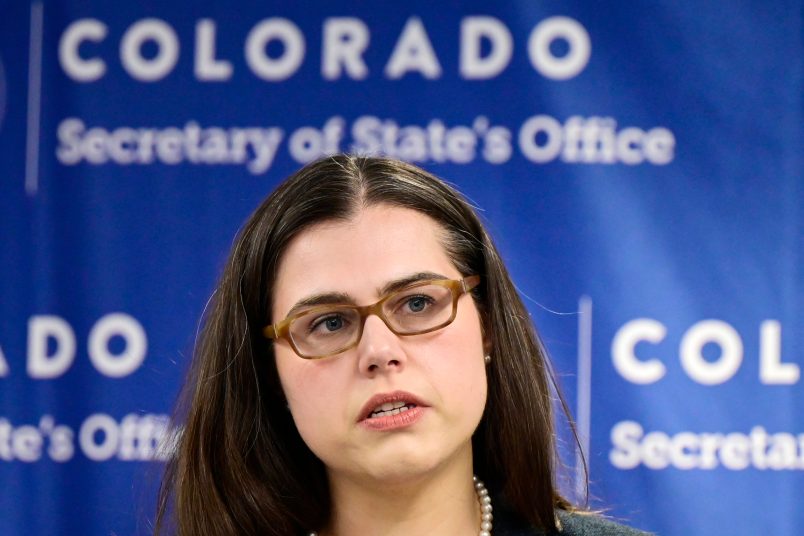The democratic process hasn’t been the same since 2020 — and if a rising, anti-democratic movement in America gets its way, we may never go back. But in the wake of unprecedented attacks on those who administer our elections, state lawmakers have scrambled to put in place new laws ahead of the midterms that would provide them with more protection.
State legislatures in Colorado, Maine, Vermont and California have each passed laws this year making it a crime to threaten or harass election workers, or making it easier to prosecute those who do. In other states, such as Wisconsin, top law enforcement officials are examining their own strategies for prosecuting such threats, while candidates to oversee elections in states such as Nevada have vowed to push for similar legislation if they take office.
Since former President Donald Trump pushed the bogus claim that the 2020 election was stolen from him, election workers across the country have faced a deluge of targeted harassment for their work.
“There’s been a really alarming rise in harassment against election workers and officials,” Gowri Ramachandran, senior counsel of the Brennan Center’s Democracy program, told TPM.
A Brennan Center poll from this past March found that one in six election officials have been threatened over their jobs. Seventy-seven percent of those polled say that these threats have increased in recent years.
At times, the intimidation has gone as far as death threats. FEC United, a Colorado-based far-right extremist group held a meeting on supposed election fraud back in February; that night, a self-proclaimed election denier claimed to have evidence of Colorado’s Secretary of State Jena Griswold engaging in criminal election conduct. (He didn’t.)
“You know, if you’re involved in election fraud, then you deserve to hang,” he then said to an applauding audience.
Secretary Griswold has since fielded a barrage of violent threats, prompting her to get help from the Colorado State Patrol.
“I’ve received an increase in threats over the last year, year and a half because of the Big Lie,” she told TPM. “Two people have actually been arrested, one fully prosecuted for threatening my life for being Secretary of State.”
The harassment became so severe that Secretary Griswold had to dip into her own funds for extra security coverage to supplement what the Colorado State Patrol was able to provide. “Starting back in February, we hired private security,” she said.
The state legislature has since passed the Colorado Election Official Protection Act, to protect election workers who’ve experienced threats related to the Big Lie, as a result.
Intimidation campaigns have driven lawmakers to pass similar bills in states including Oregon, Vermont and California, where threats have been persistent and vicious. In one example considered by the Oregon legislature, an administrator in Medford, Oregon, told Stateline that a menacing message was painted in big white letters on a parking lot outside of her office weeks after the 2020 election: “Vote don’t work. Next time bullets.”
Maine’s election offices saw high turnover rates in the wake of the 2020 election. The state legislature approved a bill in April that added threatening an election official to the state’s criminal code and required the secretary of state to report threats aimed at public officials to a legislative committee.
“No local election official should have to worry about violent threats just for doing their job,” Representative Bruce White (D-Waterville), who introduced the bill, told TPM.
Ramachandran, of the Brennan Center, has spoken with many election workers who’ve faced threats since the Big Lie began to propagate. In February 2021, she testified before Oregon’s state assembly about the need for more comprehensive legislation protecting poll workers.
“The threats got so bad in the weeks before and after Election Day that several officials had to temporarily abandon their homes, fearing for their safety,” she testified. “Others required round-the-clock police surveillance.”
She noted that the threats have expanded to target the poll workers’ families, and many have had to do the same as Griswold: put up their own funding for extra security.
“It’s really heartbreaking when you hear these stories,” Ramachandran told TPM. “It’s just really terrible that people who are providing a public service to all of us have to pay out of their own pocket just to be safe. It’s unacceptable, frankly.”
The federal government has tried to give poll workers extra protections: The Cybersecurity and Infrastructure Security Agency (CISA), for example, has issued guidance on how election workers can beef up their security, and provided free physical security assessments for the offices where the officials work.
But Ramachandran told TPM that these measures aren’t enough. “Unfortunately, as they’ve been providing those assessments, a number of election offices have found that they don’t have the money to actually implement all the recommendations CISA gives them,” she explained. “Some financial aid from the federal government could be really helpful.”
“I think we’re seeing increased destabilization of American elections,” Secretary Griswold said. “I hope the violent rhetoric will stop sometime soon, but maybe it won’t.”







Being in PA, I would have like to see that they were among the states…Sadly NO.
The midterms need to be an absolute beatdown.
TFG’s legacy continues. We will be unwinding and defusing his shitbombs for decades.
Can’t expect too much from our state legislature, I’m afraid. Maybe the governor can do something.
To get out this mess the US needs to have Dem majorities in both houses and a Dem President for several generations.